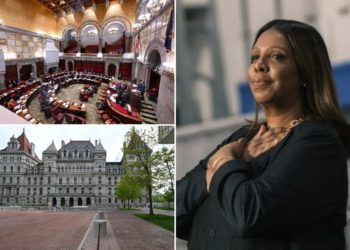PARIS — French Prime Minister François Bayrou has survived the last in a series of four no-confidence motions leveled against his government over a period of mere days. But as he looks down from what he called a budgetary “Himalaya,” the 73-year-old centrist veteran faces a rocky road ahead, with little to hold on to.
The fraught process of forcing his spending plans through parliament without a vote involved putting his government’s survival on the line and left him with a base of support no bigger than when he took office. Few lawmakers were happy about the €53 billion in spending cuts and tax hikes Bayrou demanded to bring down France’s soaring budget deficit.
The opposition Socialists, whose support the prime minister had spent weeks courting, said they were against the Bayrou budget but opted not to vote it down in the name of stability, seemingly riding the winds of public opinion.
A Feb. 6 survey of 1,000 French voters by pollster Elabe showed 60 percent of respondents approved the decision not to topple the government, even though 62 percent opposed its spending plans. Some 76 percent believed the government wouldn’t be able to pass any major legislation until the next elections.
Indeed, any future attempts to legislate on hot-button issues could topple Bayrou given the limited support he enjoys.
The French PM is boxed in with little room for maneuver, but a brewing debate on immigration could force him to take a side on one of France’s most emotive political topics.
Bayrou effectively opened a debate on the subject last month when he said it felt as if parts of France were being “flooded” by immigrants. The comments, which echoed far-right rhetoric on migration, threatened to upend his efforts to get the Socialists to back his budget. The party said it was outraged and vowed to put forward its own no-confidence motion over the government’s refusal to uphold “republican values” once the budget was finalized.
The measure likely won’t pass without the support of the National Rally, which is unlikely. “We’re not signing this rag,” said a lawmaker close to the party’s former president, Marine Le Pen, who was granted anonymity to explain the party’s strategy after having discussed the matter during a group meeting.
Within his ranks, Bayrou appears to have opened the door for two of his most conservative Cabinet members, Interior Minister Bruno Retailleau and Justice Minister Gérald Darmanin, to try to scrap birthright citizenship, less than two years after tightening the screws on immigration.
Being born on French soil does not guarantee citizenship, as it does in the United States, but someone born in France to foreign parents can become a citizen at 18 if they still live in the country and have done so for at least five years since the age of 11.
Darmanin and Retailleau’s plans have created tensions within the coalition that supports French President Emmanuel Macron. Elisabeth Borne, a former prime minister and the current education minister, spoke out against the proposal to reform birthright citizenship, as did Foreign Affairs Minister Jean-Noël Barrot.
A schism on immigration could prove fatal to both Bayrou’s government, which includes centrists and conservatives, and to the coalition of moderates on the left and right who came together to back Macron’s pro-business platform when he was first elected president in 2017, said a former high-ranking lawmaker in the pro-Macron ranks.
“If the group were to explode, it wouldn’t be on tax policies, it would be on something like immigration,” the former member of parliament, who was granted anonymity to speak candidly, said.
Sofiane Zaizoune contributed to this report.
The post French PM Bayrou survives budget fight but finds himself boxed in appeared first on Politico.




